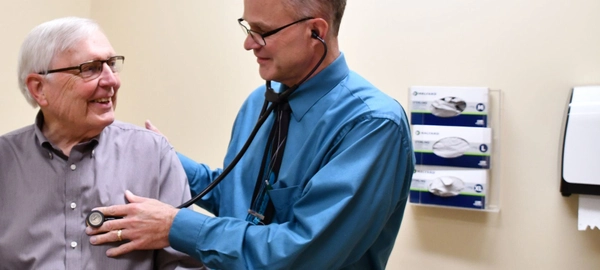

Men's Health
On average, men live about five years less than women — and it's not just genetics. Men are more likely to take risks, work dangerous jobs, carry extra weight, and face chronic conditions like heart disease and diabetes. They're also more likely to struggle silently with stress, isolation, or depression — and less likely to see a doctor until something goes wrong.
That needs to change.
Taking care of your health is one of the smartest moves you can make. Regular checkups, preventive screenings, and honest conversations with your family medicine physician can add years to your life — and life to your years.
Sioux Center Health is here to support men at every stage with care that’s proactive, personal, and focused on keeping you strong — physically, mentally, and emotionally.
Top Men's Health Risks
Heart disease is the number one cause of death among men, claiming hundreds of thousands of lives each year. Often referred to as a "silent killer," heart disease can develop gradually—sometimes with no noticeable symptoms—until a major event like a heart attack or stroke occurs.
Several common risk factors contribute to heart disease, many of which are preventable or manageable. These include high blood pressure, high cholesterol, smoking, poor diet, lack of physical activity, and chronic stress. Unfortunately, many men may not realize they’re at risk until it’s too late.
Routine health checkups, knowing your numbers (blood pressure, cholesterol, glucose), and making healthy lifestyle changes can significantly reduce your risk. Eating a balanced diet, staying active, managing stress, and quitting smoking are powerful steps toward protecting your heart.
Cancer is a major health concern for men, with about 1 in 2 men being diagnosed with some form of cancer in their lifetime. While prostate cancer is the second most commonly diagnosed after skin cancer, lung cancer remains the deadliest—largely due to smoking and long-term tobacco exposure. Colorectal cancer is another leading threat, often influenced by diet, lifestyle factors, and family history. Regular screenings, healthy habits, and early detection are essential tools for reducing risk and improving outcomes.
Unintentional injuries—often referred to as accidents—are a leading cause of death among men, especially in younger age groups. In fact, men are significantly more likely than women to die from accidental causes, including motor vehicle crashes, falls, substance-related incidents, and workplace injuries.
Several factors contribute to this higher risk. Risk-taking behavior, such as speeding, impaired driving, or neglecting safety protocols, is more common among men. Men also make up the majority of workers in high-risk industries like construction, transportation, and manufacturing — where injury rates are higher.
Substance use is another major factor. Alcohol and drugs not only impair judgment and reaction time but are also linked to a greater likelihood of accidental injuries and fatalities.
Many of these injuries are preventable. Using your seatbelt, driving safely, seeking treatment for substance abuse, and practicing workplace safety measures can help reduce the risk. Understanding the patterns behind unintentional injuries is the first step toward protecting your health and your life.
Achieving better health begins with consistent, everyday habits. Eating a balanced diet, staying physically active, and getting enough quality sleep are all essential parts of maintaining long-term wellness.
While diet and exercise often take the spotlight, sleep plays a critical — and often overlooked — role in weight management. Poor or insufficient sleep can disrupt the hormones that regulate hunger and metabolism, leading to increased cravings, reduced willpower, and a higher likelihood of overeating. Over time, this can contribute to weight gain and difficulty maintaining a healthy body mass index (BMI).
Getting 7–9 hours of quality sleep each night allows your body to repair, regulate blood sugar, balance appetite hormones like leptin and ghrelin, and support overall energy levels. Inadequate sleep, on the other hand, has been linked to a higher risk of obesity and related health conditions.
By prioritizing rest along with a nutritious diet and regular movement, you give your body the full support it needs to maintain a healthy weight and reduce your risk for chronic diseases like heart disease, type 2 diabetes, and certain cancers.
If you currently smoke or use tobacco products, quitting is one of the most important steps you can take to improve your health and reduce your risk of serious diseases—including heart disease, lung cancer, stroke, and chronic respiratory conditions.
Whether you’re ready to quit today or just thinking about it, consider enrolling in a tobacco cessation program. These programs provide guidance, resources, and strategies tailored to help you overcome cravings, manage withdrawal symptoms, and build new, healthier habits.
You don’t have to do this alone. From behavioral health therapy to nicotine replacement therapies and medications, effective tools are available to increase your chances of success.
Chronic lower respiratory diseases — like COPD (chronic obstructive pulmonary disease) — are a major health risk for men, especially those who smoke or have long-term exposure to dust, fumes, or other lung irritants.
These conditions develop gradually and can cause persistent cough, shortness of breath, and reduced lung function. Because symptoms may be subtle at first, many men delay getting help, which can lead to serious complications.
Quitting smoking and avoiding harmful exposures are the most important steps to protect your lungs. Regular checkups and lung function tests can help detect problems early and improve outcomes.
If you’re experiencing ongoing breathing issues, don’t wait—talk to your healthcare provider today.
Stroke is a leading health threat for men, especially those with uncontrolled high blood pressure, diabetes, obesity, or sedentary lifestyles. Without prompt treatment, a stroke can cause permanent brain damage or even death.
Managing these risk factors through regular checkups, healthy habits, and timely medical care is crucial. Early recognition and rapid response save lives and improve recovery.
At Sioux Center Health, we’re nationally recognized by the American Heart Association for providing fast, expert stroke care in our 24/7 ER.
Age Specific Recommendations
- Schedule an annual wellness visit to establish your health baseline.
- Discuss mental health and lifestyle habits like diet, exercise, and substance use.
- Get vaccinated as recommended (e.g., HPV, flu, COVID-19).
- Continue annual wellness visits to monitor blood pressure, cholesterol, and weight.
- Begin discussions about family history and cancer risk with your doctor.
- Consider skin checks for unusual moles or spots.
- Stay active and maintain a healthy diet to prevent early heart disease.
- Maintain annual wellness visits to screen for high blood pressure, diabetes, and cholesterol.
- Discuss prostate cancer risk with your healthcare provider—screenings may begin if you’re at higher risk.
- Schedule a colonoscopy if you have a family history or other risk factors.
- Monitor vision and hearing health regularly.
- Continue annual wellness visits and manage chronic conditions.
- Get regular colorectal cancer screenings (colonoscopy recommended starting at age 50).
- Talk to your doctor about prostate cancer screening options.
- Have your bone density checked if at risk for osteoporosis.
- Schedule regular vision and hearing tests.
- Focus on heart health with screenings and lifestyle adjustments.
- Maintain annual wellness visits for ongoing management of heart, bone, and metabolic health.
- Keep up with cancer screenings based on your doctor’s advice.
- Get routine bone density scans to monitor for osteoporosis.
- Have regular vision and hearing exams to maintain quality of life.
- Stay physically active and engage in social and cognitive activities for overall well-being.
Men's Health Physicians







Contact Us
We're here for you.
Give us a call at (712) 722-1271 or explore more ways to connect with us. We're happy to help — anytime, any way we can.
